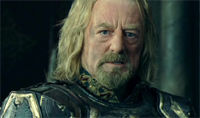
Classic CC2K: The Two Towers Strike Back
Written by: The CinCitizens
In this classic CC2K team-up, Tony Lazlo and Lance Carmichael discuss Peter Jackson’s Lord of the Rings trilogy, with a focus on its excellent middle chapter.
The Two Towers is the best of the Lord of the Rings trilogy expressly because of its departures from the original text. An ongoing discussion of the Lord of the Rings movies
The Lord of the Rings movies, not surprisingly, elicited passionate reactions from LOTR fans, most of whom treat Tolkien’s bloated, imperfect original novel like the fucking bible. The typical objection raised against the movies usually involves some detail where Peter Jackson and his team departed from the original narrative. To be sure, there are many departures from the original narrative, but what bewilders me about the typical LOTR maniac’s objection isn’t how they object to a macro change – Faramir’s more dramatic character arc, for example – but the niggling mania with which they squawk about any detail in the movie, no matter how minute, that doesn’t conform to the mythology laid down in the 900 ancillary texts that Tolkien and his son wrote around the central novel.
Now, to be sure, the Faramir character change initially pissed me off. I was pissed for a good year before I saw the extended edition of The Two Towers and realized that Jackson and company had expertly finessed one of Tolkien’s greatest missteps into one of the most memorable characters in the trilogy – a huge challenge, given all the other great stuff that surrounds Farmir and the fact that David Wenham’s performance and character would invariably be held up next to Sean Bean’s performance as his brother Boromir, a stunning tragic figure who belongs in the same wing of the museum where they keep Hamlet, Othello and King Lear. As characters, Boromir is a triumph, Faramir largely a blunder.
But Jackson made them both work.
This leads me to my thesis: The Two Towers is the best of the three magnificent LOTR movies expressly because of the departures it makes from the text.
And keep in mind that narrative necessity forced Jackson and company to make many of the changes they made in Towers – including an extensive second act that they had to flat-out make up. Remember when I called the original novel bloated? Well, it’s self-important, too, and packed with large swaths of what I call “Tolkienian gibberish” – those big, dumb speeches or passages that sound like a symposium at a dungeon master convention.
But here’s the thing: Tolkien’s Tolkienian gibberish is the rubric by which all Tolkienian gibberish will forever be judged, because calling LOTR a fantasy novel is like calling Pride and Prejudice a romance novel – both are magnificent works that simultaneously define and transcend their genres … but Tolkien still needs some help to make his beautiful language really soar.
Two examples (the first isn’t from Towers – sorry): At the beginning of the novel The Return of the King, when Gandalf and Pippin are riding up to Minas Tirith, Tolkien’s narrative voice describes the city:
“The white tower of Ecthelion glimmered like a spike of pearl and silver …”
And in the movie The Fellowship of the Ring, Boromir describes Minas Tirith using that very passage:
“Have you ever seen it, Aragorn? The white tower of Ecthelion, glimmering like a spike of pearl and silver …”
True, that narrative passage is pretty damn far from being useless Tolkienian gibberish, but Jackson’s choice to take that narrative passage and put it into the mouth of a character who would really want to say it encapsulates their entire philosophy of adaptation: they didn’t just put the book onscreen – that would have been disastrous – rather, they put Tolkien’s story onscreen, and as they did, they accentuated, augmented, amplified and, yes, in some cases, improved upon the author’s original intentions.
In the example with Boromir, Jackson and company already had a great character, but they searched Tolkien’s sacred text for material to make him even greater. Boromir is a tragic figure not because he’s evil, but because he is too good. His tragic error – trying to steal the ring of power from Frodo – springs not from malice, but from a deep and loyal love for his homeland, Gondor. What better way to show that than to give him one of Tolkien’s grandest descriptive passages about Gondor?

But let’s look at a wonderful scene in Towers where Jackson uses Tolkienian gibberish to great effect. At some point in the book (I don’t remember where), someone in the rustic Viking-land of Rohan sings some traditional Rohan song – and I shudder to think of the parallel universe where a non-artist, Society for Creative Anachronism lunkhead got to direct this material and forced us all to watch some jerkin-wearing twerp sing this diddy in a Vincent Yarbrough warble, plunking away at a lute with no context or purpose.
Fortunately, though, Jackson took the wonderful lyrics to this song and built a whole great scene around them. In the lead-up to the Helm’s Deep battle, we join King Theoden as his underlings outfit him for battle, and as they strap armor onto Theoden – a fractured monarch forced to relearn his kingly role, a genetic splice of King Lear and Prince Hal who never got to be a roustabout – the king recites the song like a litany, a prayer, a mantra.
There are hundreds of other examples – but I turn the floor over to my colleagues. Guys, you’ve heard my thesis. I’d love to hear your reactions to it, and any other thoughts you might have about the trilogy. Later, after I read some of your reactions, I’ll discuss further the fantastic middle act of Towers and how it wonderfully adds to the movie trilogy and Tolkien’s entire body of work.
— Tony Lazlo
